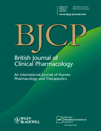
BRITISH JOURNAL OF CLINICAL PHARMACOLOGY
Scope & Guideline
Fostering Excellence in Pharmacological Research
Introduction
Aims and Scopes
- Clinical Pharmacokinetics and Pharmacodynamics:
Research on the pharmacokinetic and pharmacodynamic properties of drugs, including population pharmacokinetics, therapeutic drug monitoring, and the impact of genetic factors on drug metabolism. - Pharmacovigilance and Drug Safety:
Studies examining the safety profiles of medications, adverse drug reactions, and the effectiveness of pharmacovigilance systems in monitoring drug safety. - Therapeutic Drug Monitoring (TDM):
Research aimed at optimizing drug dosing through TDM, focusing on individual patient responses and the use of pharmacometrics to inform dosing strategies. - Pharmacogenomics:
Investigations into how genetic variations affect drug response, aiming to personalize pharmacotherapy and improve treatment outcomes. - Innovative Drug Development:
Research related to novel therapeutic agents, drug repurposing, and the application of new methodologies in drug development and clinical trials. - Medication Management and Adherence:
Studies focusing on improving medication adherence, deprescribing practices, and the role of healthcare providers in medication management. - Public Health and Policy:
Research that informs public health initiatives and drug policy, particularly in the context of chronic diseases, infectious diseases, and the impact of social determinants on medication use.
Trending and Emerging
- Integration of Artificial Intelligence and Machine Learning:
There is an increasing trend towards using AI and machine learning algorithms for drug development, pharmacokinetic modeling, and optimizing treatment protocols. - Focus on Polypharmacy and Deprescribing:
Research addressing the complexities of polypharmacy, particularly in older populations, and strategies for effective deprescribing practices are gaining prominence. - Patient-Centric Approaches to Pharmacotherapy:
Studies emphasizing patient-reported outcomes, adherence strategies, and personalized medicine approaches are becoming more common as the field shifts towards patient-centered care. - COVID-19 Related Pharmacology Research:
The pandemic has sparked a surge in research focused on pharmacotherapy for COVID-19, including vaccine efficacy, drug interactions, and management of comorbidities. - Environmental and Sustainability Concerns in Pharmacology:
There is a growing emphasis on the environmental impact of pharmaceuticals, including the need for sustainable practices in drug development and use. - Real-World Evidence and Pragmatic Trials:
Research utilizing real-world data to inform clinical practice and drug safety is trending, reflecting a shift towards understanding drug effects in diverse populations. - Advanced Statistical and Modeling Techniques:
The application of sophisticated statistical methods and modeling techniques, such as physiologically based pharmacokinetic modeling, is on the rise in clinical studies.
Declining or Waning
- Traditional Pharmacology Studies:
Research that focuses solely on traditional pharmacological studies without incorporating modern methodologies such as pharmacometrics or pharmacogenomics has become less prominent. - Single-Agent Pharmacotherapy:
Studies that investigate the efficacy of single-agent therapies without considering combination treatments or the impact of polypharmacy are being overshadowed by more complex, integrative analyses. - Generalized Drug Utilization Studies:
While drug utilization studies are still relevant, those that do not incorporate patient-centered outcomes or advanced analytical methods are receiving less attention. - Basic Science Research in Pharmacology:
Basic science studies that do not translate into clinical application or address pressing clinical questions are witnessing a decline in interest compared to translational research. - Pharmacological Reviews without Systematic Approach:
Narrative reviews that lack a systematic methodology or comprehensive analysis are becoming less favored in favor of systematic reviews with rigorous evidence synthesis.
Similar Journals

Journal of Pharmacology & Pharmacotherapeutics
Navigating the Complexities of Pharmacological ResearchJournal of Pharmacology & Pharmacotherapeutics is a vital academic resource published by SAGE Publications Inc., focusing on the diverse and evolving fields of pharmacology and pharmacotherapy. With an ISSN of 0976-500X and E-ISSN 0976-5018, this journal serves as a platform for rigorous research and innovative insights from 2010 to 2024, reflecting the latest advancements and challenges within the pharmacological landscape. Despite being placed in the Q4 quartile for both general pharmacology and medical pharmacology in 2023, it continues to be an essential resource for researchers, professionals, and students striving to understand the complexities of drug action, therapy optimization, and pharmaceutical sciences. The journal underscores the importance of disseminating critical findings to stimulate further research and collaborative dialogue. Although currently not open access, it can be accessed through leading academic databases, positioning itself as a significant entity in the medical and pharmacological research community.
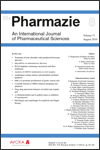
PHARMAZIE
Illuminating the future of drug development and safety.PHARMAZIE is a prestigious, peer-reviewed journal published by AVOXA-MEDIENGRUPPE DEUTSCHER APOTHEKER GMBH, focusing on the dynamic field of pharmaceutical science since its inception in 1947. With its ISSN 0031-7144 and a current impact factor placing it in the Q2 category of Pharmaceutical Science journals, PHARMAZIE has established itself as a pivotal resource for researchers, practitioners, and students alike. The journal emphasizes the dissemination of high-quality, original research in pharmacology, toxicology, and pharmaceutics, contributing to the advancement of knowledge and innovation in these fields. While currently not open access, the journal maintains a commendable Scopus rank of #94 out of 183 in its category, highlighting its relevance and appeal to the academic community. With a commitment to bridging the gap between research and practical applications, PHARMAZIE plays a crucial role in shaping the future of pharmaceutical practices and policies.
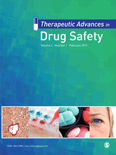
Therapeutic Advances in Drug Safety
Connecting Researchers and Practitioners for Safer TherapiesTherapeutic Advances in Drug Safety is a prestigious open-access journal published by SAGE Publications Ltd that has made significant strides in the field of pharmacology since its inception in 2010. With an impressive impact factor that places it in the Q1 category for Pharmacology (medical), this journal ranks 61st out of 272 in Scopus, showcasing its global influence and commitment to advancing drug safety research. Based in the United Kingdom, it aims to bridge the critical gap between pharmacological innovation and clinical application, offering a platform for the dissemination of groundbreaking research, case studies, and expert reviews. Since adopting an Open Access model in 2019, the journal has significantly increased its reach, ensuring that vital findings in drug safety are accessible to researchers, healthcare professionals, and educators worldwide. As the field of drug safety continues to evolve, Therapeutic Advances in Drug Safety remains an essential resource for those dedicated to enhancing safe therapeutic practices and patient outcomes.

CLINICAL PHARMACOLOGY & THERAPEUTICS
Empowering healthcare through cutting-edge pharmacological research.CLINICAL PHARMACOLOGY & THERAPEUTICS, published by WILEY, stands at the forefront of pharmacological research, serving as a pivotal resource for researchers, healthcare professionals, and students in the medical field. With its prestigious Q1 rating in both Pharmacology and Pharmacology (medical) categories, and ranking in the top 4% of journals in the field, it provides cutting-edge insights into drug therapy, pharmacokinetics, and innovative treatment strategies. The journal features a wide range of articles, from original research to comprehensive reviews, all aimed at advancing knowledge and clinical practice in pharmacology. With a publication history dating back to 1960 and continuing through 2024, its commitment to excellence is evident in its robust impact factor and high visibility in the academic community. For professionals striving to stay at the forefront of pharmacological advancements, CLINICAL PHARMACOLOGY & THERAPEUTICS remains an essential platform for disseminating and accessing vital research findings.
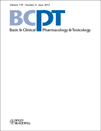
BASIC & CLINICAL PHARMACOLOGY & TOXICOLOGY
Connecting Basic Science with Clinical ApplicationsBASIC & CLINICAL PHARMACOLOGY & TOXICOLOGY, published by WILEY, serves as a vital resource in the fields of medicine, pharmacology, and toxicology. With an ISSN of 1742-7835 and E-ISSN 1742-7843, this journal has established a robust reputation, reflected in its Q2 classification across its categories in 2023. It aims to disseminate high-quality research and reviews that bridge the gap between basic scientific findings and clinical applications. Operating from the United States with an address at 111 RIVER ST, HOBOKEN 07030-5774, NJ, this journal focuses on the intersection of drug action and toxicity, making it an essential platform for researchers, healthcare professionals, and students. With a converged publication timeline from 2004 to 2024, BASIC & CLINICAL PHARMACOLOGY & TOXICOLOGY continues to make significant contributions to understanding pharmacological treatments and toxicological challenges. Open access options are available to broaden the reach and impact of its published work.
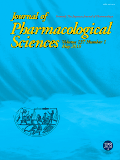
Journal of Pharmacological Sciences
Exploring the frontiers of pharmacology and medicine.Journal of Pharmacological Sciences is a leading peer-reviewed academic journal dedicated to the field of pharmacology, published by the Japanese Pharmacological Society. Since its inception, this journal has offered an essential platform for the dissemination of high-quality research, contributing significantly to advancements in molecular medicine and pharmacology. With an impact factor that places it in the prestigious Q2 quartile for both categories, the journal has established itself as a credible source of innovative findings and methodologies since its transition to Open Access in 2015. This accessibility enables a broader audience, including researchers, healthcare professionals, and students, to engage with valuable insights and discussions pertinent to drug development, pharmacodynamics, and therapeutic strategies. Based in Kyoto, Japan, the journal serves as a vital resource for the global pharmacological community, encouraging collaboration and research that leads to improved health outcomes. For more information, submissions, and access to the latest research, visit the journal’s website.
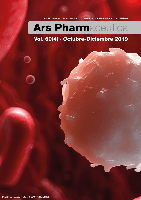
Ars Pharmaceutica
Championing excellence in pharmaceutical research and innovation.Ars Pharmaceutica is a distinguished open-access journal published by UNIV GRANADA, EDITORIAL, that has been at the forefront of pharmaceutical sciences since its establishment. With ISSN 0004-2927 and E-ISSN 2340-9894, this journal aims to disseminate high-quality research in pharmacology, toxicology, and pharmaceutics, contributing to the advancement of the field. With a historical scope that spans from 1980 to 2017, it has played a pivotal role in shaping the discourse surrounding pharmaceutical science and its intersection with the arts and humanities. Although currently ranked within the 13th percentile in Scopus for Pharmaceutical Science and the 11th percentile for History and Philosophy of Science, Ars Pharmaceutica continues to uphold its commitment to academic excellence and innovation. By providing a platform for open-access research, it encourages collaboration and knowledge sharing among researchers, professionals, and students, thus enhancing the broader understanding of pharmaceutical developments and their societal implications.

DRUGS & THERAPY PERSPECTIVES
Catalyzing Change in the World of Pharmacology and TherapyDRUGS & THERAPY PERSPECTIVES is an esteemed journal published by SpringerNature, dedicated to advancing knowledge in the field of pharmacology and therapeutic studies. With an ISSN of 1172-0360 and an E-ISSN of 1179-1977, this journal has been providing valuable insights since its inception in 1993 and continues to publish until 2024. Ranked in the Q3 category for Pharmacology (medical) and positioned within the 25th percentile according to Scopus rankings, it serves as a vital resource for researchers, practitioners, and students alike. Although it is not an open-access journal, it offers a comprehensive platform for innovative research, clinical practices, and evolving therapeutic strategies, reflecting the critical developments in drug therapy landscape. With its strategic emphasis on bridging academic studies and clinical applications, DRUGS & THERAPY PERSPECTIVES remains essential for those committed to enhancing drug efficacy and patient outcomes in the ever-evolving medical field.

Frontiers in Pharmacology
Unlocking the potential of pharmacology through open access.Frontiers in Pharmacology, published by FRONTIERS MEDIA SA, stands as a leading open-access journal dedicated to advancing the field of pharmacology since its inception in 2010. With its ISSN 1663-9812, the journal is based in Switzerland and maintains a vital role in disseminating innovative research findings that span various disciplines within pharmacology, including pharmacokinetics, toxicology, and pharmacogenetics. In 2023, Frontiers in Pharmacology has achieved an impressive standing within the scientific community, being ranked in the Q1 category for both general and medical pharmacology, highlighting its critical contribution to the field with a Scopus ranking of #41 out of 272 in medical pharmacology and #76 out of 313 in pharmacology, toxicology, and pharmaceutics, placing it in the 75th and 85th percentiles, respectively. Researchers and practitioners benefit from its open-access model, which ensures widespread accessibility to groundbreaking research, fostering collaboration and innovation across the pharmaceutical sciences. With its commitment to excellence, Frontiers in Pharmacology serves as an essential resource for those looking to explore and contribute to the latest advancements in pharmacological research.

Clinical Pharmacology-Advances and Applications
Empowering Research for Better Patient OutcomesClinical Pharmacology-Advances and Applications is a premier open access journal published by DOVE MEDICAL PRESS LTD, based in New Zealand. Since its establishment in 2009, the journal has been dedicated to advancing the field of pharmacology by disseminating innovative research and applications related to medication therapy and patient outcomes. With its notable impact factor and current ranking within the top percentile of pharmacology journals, it provides an invaluable platform for researchers, healthcare professionals, and students to share knowledge and foster collaboration. The journal's content spans a wide range of topics, ensuring coverage of both fundamental and emerging areas in medical pharmacology. As of 2023, it holds a strong position in the Q2 quartile, underscoring its relevance and influence within the scientific community. Authors and readers alike benefit from its open access model, which ensures that critical findings are widely accessible, thereby enhancing the pace of discovery and application in clinical settings.